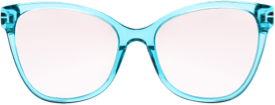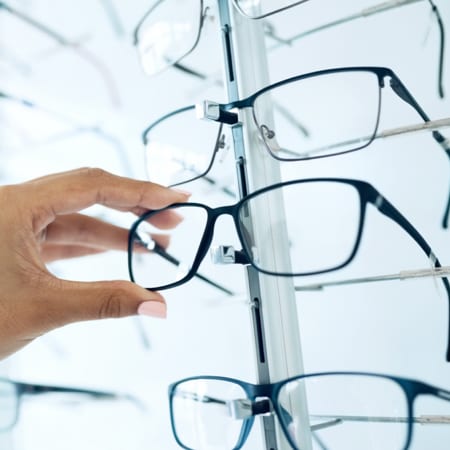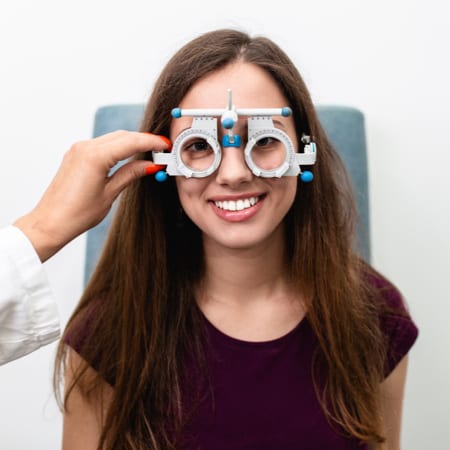Dry eyes are one of the most common complaints people have about their eyes. While allergies, digital eye strain, and seasonal changes are often the root causes of these complaints, dry eye disease is also a common culprit.
Dry eye disease causes burning, itching, redness, and sensitivity in your eyes and, yes, it can also cause blurred vision. If you have dry eye, your optometrist can help you create a care plan uniquely suited for your eyes.
This blog post will take you on a tour of dry eye and its impact on vision. We’ll explore symptoms, causes, and treatments that can help you keep your eyes feeling fresh and your vision sharp.
Understanding Dry Eye
Dry eye occurs when tears can’t adequately lubricate the eyes. This can occur when a person’s eyes don’t produce enough tears or when the tears produced evaporate too quickly.
Dry eye is often more than just a mild annoyance; it’s a genuine medical issue that affects millions of people worldwide. It’s prevalent among older adults, but is also becoming increasingly common in younger populations due to prolonged screen use.
When your eyes are adequately lubricated, your tears form a protective layer over the cornea in order to maintain moisture levels. But when this layer is compromised, your eyes can feel gritty, itchy, and irritated. The resulting discomfort often leads to rubbing, which exacerbates the issue.
Common Dry Eye Symptoms
The symptoms of dry eye vary in intensity but are usually noticeable and persistent. Common symptoms include:
- Eye fatigue
- Red eyes
- Gitty or foreign body sensation
- Stringy discharge
- Sensitivity to light
- Increased sensitivity to glare
- Eye discomfort
- Excessively watery eyes
- Blurry vision
These symptoms worsen as you spend more time in front of screens or dry environments.
How Dry Eyes & Blurry Vision Interact
When your eyes lack moisture, the surface of the eye becomes irregular. This irregularity disrupts how light enters the eye, leading to blurriness. The discomfort caused by dry eyes also makes it difficult to focus, contributing to the sensation of blurred vision.
When you blink, the tear film is supposed to be spread evenly across your eye’s surface. However, with dry eye, the tear film can break up too rapidly, causing intermittent blurriness.
Causes of Dry Eyes & Blurry Vision
Several factors contribute to dry eyes and blurry vision, from environmental elements to underlying health issues.
- Prolonged screen time causes you to blink less frequently and dry out your eyes.
- Certain medications, including antihistamines and antidepressants, can decrease tear production, leading to dryness.
- Medical conditions like rheumatoid arthritis or diabetes can exacerbate dry eye symptoms, impacting vision.
- Environmental factors like air conditioning, smoke, and wind can accelerate tear evaporation, leaving eyes dry and irritated.
Understanding these causes allows you to take preventative measures and protect your vision.
Treatment for Dry Eyes & Blurry Vision
Effective treatment for dry eyes and blurry vision requires lifestyle changes and medical interventions. Adding moisture can temporarily relieve dry eyes, but over-the-counter artificial tears may not address the root cause.
Prescription medications like cyclosporine can help increase tear production and reduce inflammation. Punctal plugs, which block tear drainage, can sometimes offer a more permanent solution. Consult with an eye care professional to determine the best approach for your specific needs.
In-Office Dry Eye Treatments
- Intense Pulsed Light (IPL) uses broad-spectrum light to reduce inflammation and promote the function of the meibomian glands, thereby improving tear quality. Heat softens clogged oils, allowing them to flow properly.
- LipiFlow is designed to address meibomian gland dysfunction. This procedure employs heat and gentle pressure to unblock the meibomian glands, restoring natural oil flow to the eye’s surface and enhancing tear stability.
- Radiofrequency treatments target clogged meibomian glands, generating heat to liquefy thickened meibum for gentle removal. This therapy can enhance tear film quality and reduce symptoms over time.
- Zocular Eyelid System Treatment (ZEST) cleans the eyelids and addresses inflammation. This procedure uses a gentle cleanser to remove debris and bacteria, reducing irritation and improving tear quality.
At-Home Dry Eye Treatments
Lifestyle adjustments, such as taking regular breaks from screens and increasing humidity at home, can also help alleviate symptoms. These changes and appropriate medical treatments can improve eye health and vision clarity.
- Omega-3 fatty acids have been shown to improve tear production and reduce inflammation, making them a valuable addition to your dry eye treatment regimen. These supplements can enhance the quality of your tears and alleviate discomfort.
- Thealoz Duo Drops & Gel are specially formulated to hydrate and protect the eyes. These products contain trehalose, a sugar known for its protective properties, and hyaluronic acid, which provides long-lasting moisture.
- Bruder Masks are microwavable eye compresses designed to relieve dry eye symptoms by applying heat. The heat helps unblock meibomian glands, promoting the release of natural oils and improving tear film stability.
- Ocunox Eye Ointment is a nighttime treatment that provides extended moisture to the eyes while you sleep. It’s formulated to protect against dryness and irritation, ensuring a comfortable start to your day.
Preventing Dry Eye & Blurred Vision
Prevention is critical to maintaining eye health and preventing dry and blurred vision. Simple lifestyle changes can significantly affect your comfort and visual clarity.
- Take regular breaks from screens
- Practice the 20-20-20 rule
- Create a humid environment
- Stay hydrated
Woodstock Vision Care promotes educating patients about the connection between dry eyes and blurred health to help empower them to take control of their eye health. Contact us today to see how we can help you find relief for your dry eye symptoms.
















